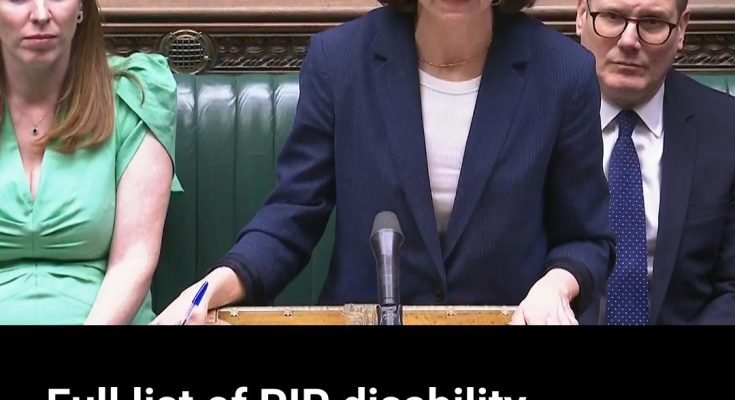A major overhaul of the Personal Independence Payment (Pip) disability benefit will mean around a million people lose out on thousands of pounds from November next year.
Many Brits with disabilities rely on Pip to pay the extra costs they face as a result of their conditions.
According to charity Scope, disabled households need an additional £1,010 each month to have the same standard of living as their non-disabled counterparts.
That is the gap that Pip aims to reduce.
The benefit is not means-tested, meaning people with similar disabilities will get similar amounts of money no matter what their income is or how much they have in savings.
In the House of Commons today, Work and Pensions Secretary Liz Kendall said that principle would not change – but the way of deciding who qualifies will.
She said the moves would aim to save £5 billion by the end of this decade.
But a boss at disability charity Scope accused the government of ‘choosing to penalise some of the poorest people in our society’.
What are Pip benefits?
The Personal Independence Payment began to be rolled out in 2013 amid the phase-out of the Disability Living Allowance for most recipients in England and Wales.
Today, disabled children in England and Wales get Disability Living Allowance and switch to Pip when they turn 16 – although the BBC has found the switch from one to the other is not always smooth, even for those with life-changing conditions like cancer, blindness and epilepsy.
James Taylor, the director of strategy for Scope, told Metro: ‘The significance of Pip is that it recognises life isn’t easy and offers some financial support.’
However, he said the current rate ‘doesn’t go anywhere near far enough’ to cover the extra expense that many disabled people face.

At the moment, the basic rate of living allowance provided weekly via Pip is £72.65 and the enhanced rate is £108.55 – well below the £1,010 a month typically needed according to Scope’s calculations.
The amount a recipient gets is based on the amount of aid and supervision they need for everyday tasks, and extra is available for those with mobility issues.
This is worked out through a system of points depending on the areas where people struggle most.
Health professionals rate each recipient on a scale of zero to 12 for the amount of support they need for everyday tasks, such as preparing food and washing.
It is this points system that lies at the centre of today’s changes.
What changes are coming to Pip benefits?
Speaking to MPs this afternoon, Liz Kendall said Pip would not be frozen, as had been reported earlier this month.
But she added: ‘People will need to score a minimum of four points in at least one activity to qualify for the daily living element of Pip from November 2026.
‘This is not affect the mobility component of Pip and only relates to the daily living element.’
The intention is to stop people who are given low scores across a range of areas from being able to claim the benefit, and limit it only to people who are most severely disabled.
In addition, a review is being launched into the Pip assessment, which will be led by Social Security and Disability Minister Sir Stephen Timms.
This would be run ‘in close consultation with disabled people, the organisations that represent them and other experts’, Kendall said.
The minimum age to claim the benefit will rise from 16 to 18.
Away from Pip, the Work and Pensions Secretary announced a consultation on merging Job Seekers’ Allowance and Employment Support Allowance into a time-limited unemployment insurance.
She also said the work capability assessment for Universal Credit (UC) will be scrapped in 2028, with extra financial support for health conditions and UC ‘available solely through the Pip assessment’.
People on UC with the most severe disabilities and health conditions, meanwhile, will never be reassessed ‘to give them the confidence and dignity they deserve’, Kendall said.
Why are these changes being made?
To begin her statement today, Kendall reeled off a list of statistics to demonstrate the state of the benefits system.
One in ten people of working age are now claiming a sickness or disability benefit, she said, while one in eight young people are not in education, employment or training.
Since the pandemic, spending on working age sickness and disability benefits are up £20 billion and are forecast to rise by £18 billion by the end of the Parliament in 2029 – a situation not seen in comparable countries.
Sir Keir Starmer has argued the UK benefits system is in a ‘worst of all worlds situation’, which discourages people from working and lands the taxpayer with a ‘spiralling bill’.
The PM has also repeatedly pointed to the concerning state of the public finances, saying a ‘£22 billion black hole’ was handed over by the previous Conservative government.
A DWP spokesperson said: ‘Without reform more people will be locked out of jobs, despite many wanting to work. That is not just bad for the economy, it’s bad for people too.
‘We have a duty to get the welfare bill on a more sustainable path and we will achieve that through meaningful, principled reforms rather than arbitrary cuts to spending.’
What is the reaction to the potential changes?
Responding to Kendall’s statement, the Labour chair of the Work and Pensions Committee Debbie Abrahams said there are ‘alternative, more compassionate ways to balance the books that on the back of sick and disabled people’.
She added: ‘I absolutely fundamentally believe that [Kendall] is on the right course, and I implore my party to try and get our reforms to bed in first before we look to making the cuts.’
Several other voices from the Labour benches voiced concerns, including Rachael Maskell who said the £5 billion cut was ‘incongruous’ with optimising the independence of disabled people.
Former Shadow Chancellor John McDonnell, who had the party whip suspended last year but still sits among Labour MPs, said the cuts ‘will result in immense suffering and – we’ve seen it in the past – loss of life’.
Charles Gillies, Senior Policy Officer at the MS Society and Policy Co-Chair at the Disability Benefits Consortium, said the ‘immoral and devastating’ cuts would ‘push more disabled people into poverty, and worsen people’s health.’

He added: ‘The harmful changes to Pip will make it even harder for disabled people – including many with MS – to manage the overwhelming additional costs of their condition, from wheelchairs to visits from carers.
More Trending
‘And any targeted cuts to disabled people on Universal Credit (UC) and Employment and Support Allowance (ESA) will largely hit those who are unable to work and rely on these benefits to survive.’
James Taylor, Executive Director of Strategy at disability equality charity Scope, said: ‘The biggest cuts to disability benefits on record should shame the government to its core.
‘They are choosing to penalise some of the poorest people in our society. Almost half of families in poverty include someone who is disabled.’
He continued: ‘The government will be picking up the pieces in other parts of the system with pressure on an already overwhelmed NHS and social care, as more disabled people are pushed into poverty.
‘We expect the consultation will see an overwhelming response. We urge the government to listen to disabled people and think again.’
Get in touch with our news team by emailing us at webnews@metro.co.uk.
For more stories like this, check our news page.
MORE: The Metro daily cartoon by Guy Venables
MORE: England’s Six Nations thrashing of Wales reveals way forward for Steve Borthwick’s side
MORE: Labour wouldn’t cut my PIP after spending a day in my shoes
















































